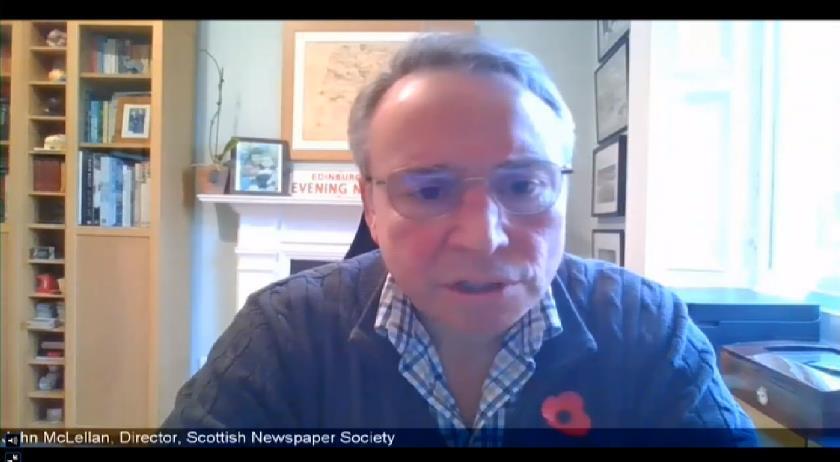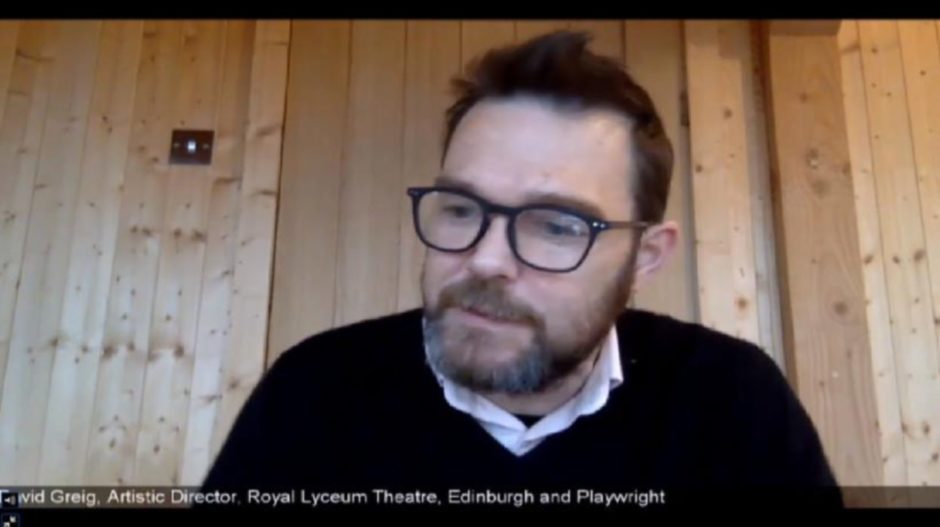The director of the Scottish Newspaper Society has claimed controversial new hate crime laws could pose a “significant danger” to media publishers.
John McLellan said the proposed legislation may leave “law-abiding” individuals open to “police investigation”, adding they could be put “through the mill” to prove their innocence.
MSPs on the Scottish Parliament’s Justice Committee took oral evidence from a range of organisations on Tuesday including writers, theatre representatives, faith and secularist groups.
The Hate Crime Bill, which is currently in stage one in the Scottish Parliament, has been condemned by some groups who claim it hinders free speech.
However, Justice Secretary Humza Yousaf revealed last month he was “actively considering” both the “breadth and the depth” of freedom of expression clauses” contained within the bill.
Mr McLellan said the process of investigation is as “serious as being convicted” and could result in “people’s lives being put on hold”.
The Scottish Newspaper Society director told MSPs the implications of this were “huge” and police would “have to investigate” any claims made under the new legislation.
He added it could see: “People who have led law-abiding lives and done nothing wrong finding themselves in the end of police investigations.
“People would be put through the mill to prove they had nothing to answer for.”
He added: “It would be a brave person who would risk going to jail for seven years for something they had written.”
Fears of ‘undue burden’ on journalists
Lisa Clark, project manager at Scottish PEN, a not-for-profit organisation that defends the freedom of writers and readers, said they would not want to see an “undue burden” placed on journalists and would therefore welcome any “clarity” that could be provided on this matter.
Other representatives from the artistic community have raised concerns that theatre has been singled out within section four of the bill.
David Greig, artistic director of The Lyceum Theatre in Edinburgh, claimed this part of the legislation was “broadly speaking unnecessary”.
By identifying theatre specifically, he said it was as if a “solution is being looked for to a problem that doesn’t exist”.
The theatre director told MSPs that playwrights “often want to put up on stage views that we are expected to challenge and indeed disapprove of very wholeheartedly”, adding this tradition dated back to the Ancient Greeks who used theatres to “explore taboo and the breaking of boundaries”.
He pointed to the example of Jerry Springer: The Opera – a musical that was picketed by protesters in 2005.
“There could be circumstances in which the producers might decide to shut the play down to avoid the costs associated with it,” he added.
‘Get out of jail free card’
Faith and belief groups also gave evidence to Holyrood’s Justice Committee on Tuesday.
Currently in Scotland, the offence of ‘stirring up hatred’ only offers protection in respect to race but under the new legislation this will be expanded to include the characteristics of age, disability, religion, sexual orientation, transgender identity and variation in sex characteristics.
In September Mr Yousaf announced a change in the criminal threshold for the offence from “likely” to stir up hatred to “intent only” in respect of the seven protected groups.
However, Ephraim Borowski, director of the Scottish Council of Jewish Communities, said this was a “retrograde” step, as anti-Semitism is on the rise.
He said: “They are now given a get out of jail free card because they could just say, ‘oh, we didn’t intend to cause offence; we were merely asking a question about whether the Holocaust happened’.”
Other faith groups expressed concerns about the definition of “inflammatory” material under the new law, with fears certain religious texts could be caught up in it.
Anthony Horan, director of the Catholic Parliamentary Office, said: “We’ve given the example before of the Catholic understanding of the human person and the belief that gender is not fluid and changeable.
“And that might be something that could be considered inflammatory by some people and lead to a police investigation.”
‘Need for additional amendments to the bill’
Jamie Gillies, spokesman for campaign group Free to Disagree, said: “Today’s evidence session further underlined the need for additional amendments to the Hate Crime Bill.
“Journalists and creatives are still concerned about a chill being placed on their work and the prospect of columnists, writers and others being drawn into the criminal justice system – even when conduct would never meet the threshold for an offence.
“Religious groups again emphasised the need for stronger free speech protections. And theatre representatives criticised the singling out of plays. The change on ‘intent’ announced recently was welcomed by all but it is by no means considered a ‘magic bullet’.
“Many of the concerns critics have relate to the subjective language of the bill. What will the terms ‘abusive’, ‘hatred’ and ‘inflammatory’ be taken to mean? And what might the scope of new offences be? Much more clarity is required.
“It is perfectly possible to enshrine strong protections for victims whilst also ensuring freedom of speech and expression. With careful deliberation and more key amendments, the bill can achieve this.”



